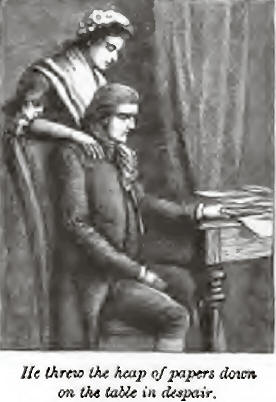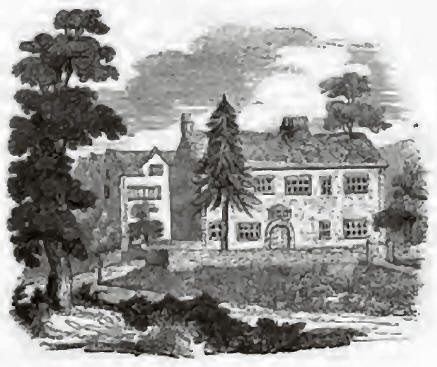After a delay of some months, Mr Harvey called upon Mr
Campbell, and stated to him that the claim of the opposite party, so far
from being fraudulent, as he had supposed, was so clear, that he feared
the worst results.
It
appeared that the heir to the estates, who had remained between Mr
Campbell’s title, had married in India, and had subsequently, as it had
been supposed, died; but there was full and satisfactory proof that the
marriage was valid, and that the party who claimed was his son. It was
true, Mr Harvey observed, that Mr Campbell might delay for some time the
restoration of the property, but that eventually it must be surrendered.
As
soon as Mr Campbell received this letter, he went to his wife and
acquainted her with all that had been going on for some months, and with
the reasons which induced him to say nothing to her until the receipt of
Mr Harvey’s letter, which he now put into her hands, requesting her
opinion on the subject. Mrs Campbell after having read the letter,
replied—
“It appears, my dear husband, that we have been called to take
possession of a property, and to hold for many years that which belongs
to another. We are now called upon to give it up to the rightful owner.
You ask my opinion; surely there is no occasion to do that. We must of
course now, that we know that the claim is just, do as we would be done
by.”
“That is, my dearest, we must surrender it at once, without any more
litigation. It certainly has been my feeling ever since I have read Mr
Harvey’s letter. Yet it is hard to be beggars.”
“It is hard,
my dear husband, if we may use that term; but, at the same time, it is
the will of Heaven. We received the property, supposing it to have been
our own; we have, I hope, not misused it during the time it has been
intrusted to us; and, since it pleases Heaven that we should be deprived
of it, let us, at all events, have the satisfaction of acting
conscientiously and justly, and trust to Him for our future support.”
“I
will write immediately,” replied Mr Campbell, “to acquaint Mr Harvey,
that although I litigated the point as long as the claim was considered
doubtful, now that he informs me that the other party is the legal heir,
I beg that all proceedings may be stopped, as I am willing to give
immediate possession.”
“Do so, my dear,” replied his wife, embracing him. “We may be poor, but
I trust we shall still be happy.”
Mr
Campbell sat down and wrote the letter of instructions to his solicitor,
sealed it, and sent a groom with it to the post.
As
soon as the servant had closed the door of the room, Mr Campbell covered
his face with his hands.
“It is, indeed, a severe trial,” said Mrs Campbell, taking the hand of
her husband; “but you have done your duty.”
“I
care not for myself; I am thinking of my children.”
“They must work,” replied Mrs Campbell. “Employment is happiness.”
“Yes, the boys may get on; but those poor girls! what a change will it
be for them!”
“I
trust they have been not so badly brought up, Campbell, but that they
will submit with cheerfulness, and be a source of comfort to us both.
Besides, we may not be absolutely beggars.”
“That depends upon the other party. He may claim all arrears of rent;
and if so, we are more than beggars. However, God’s will be done. Shall
we receive good, and shall we not receive evil?”
“There’s hope, my husband,” replied Mrs Campbell, in a cheering tone;
“let us hope for the best.”
“How little do we know what is for our good, short-sighted mortals as we
are!” observed Mr Campbell. “Had not this estate come to us, I should,
by following up my profession as surgeon, in all probability, have
realised a good provision for my children; now, this seeming good turn
of fortune leaves me poor. I am too old now to resume my profession,
and, if I did, have no chance of obtaining the practice which I left.
You see that which appeared to us and everyone else the most fortunate
occurrence in my life, has actually proved the contrary.”
“As far as our limited view of things can enable us to judge, I grant
it,” replied Mrs Campbell; “but who knows what might have happened if we
had remained in possession? All is hidden from our view. He acts
as He thinks best for us; and it is for us to submit without repining.
Come, dearest, let us walk out; the air is fresh, and will cool your
heated brow.”
Two days after this conversation, a letter was received from Mr Harvey,
informing them that he had made known Mr Campbell’s determination to
resign the property without further litigation; that the reply of the
other party was highly honourable, stating that it was not his intention
to make any claim for the back rents, and requesting that Mr Campbell
and family would consider Wexton Hall at their disposal for three
months, to enable them to make arrangements, and dispose of their
furniture, etcetera.
The contents of this letter were a great relief to the mind of Mr
Campbell, as he was now able to ascertain what his future means might
be, and was grateful for the handsome behaviour of the new proprietor in
not making any claim for the back rents, which would have reduced him at
once to penury. He wrote immediately to Mr Harvey, requesting him to
send in his account of legal expenses, that it might be liquidated as
early as possible. In three days it arrived, and a letter with it, in
which Mr Harvey acquainted him that it was in consequence of his having
so handsomely surrendered the property as soon as the claim was
substantiated, together with the knowledge how much the estate had been
improved during the ten years in which it had been in his possession,
which induced the new proprietor to behave in so liberal a manner. This
was very gratifying to Mr Campbell, but the legal expenses proved
enormous, amounting to many thousand pounds.
 Mr
Campbell read the sum total, and threw the huge heap of papers down on
the table in despair.
Mr
Campbell read the sum total, and threw the huge heap of papers down on
the table in despair.
“We are still ruined, my dear,” said he, mournfully.
“Let us hope not,”
replied Mrs Campbell. “At all events, we now know the worst of it, and
we must look it boldly in the face.”
“I
have not so much money as will pay this bill by nearly a thousand
pounds, my dearest wife.”
“It may be so,” replied Mrs Campbell; “but still there is the furniture,
the horses, and carriages; surely, they are worth much more.”
“But we have other bills to pay; you forget them.”
“No, I do not; I have been collecting them all, and they do not amount
to more than 300 pounds, as near as I can judge; but we have no time to
lose, dearest, and we must show courage.”
“What then do you advise, Emily?” said Mr Campbell.
“We must incur no more expense; our present establishment must be
dismissed at once. Send for all the servants to-morrow morning, and
explain what has occurred. This evening I will make it known to the two
girls and Miss Paterson, who must of course be discharged, as we can no
longer afford a governess. We must retain only the cook, housemaid, one
footman, and a groom to look after the horses until they are sold. Send
a letter to Mr Bates, the auctioneer, to give notice of an early sale of
the furniture. You must write to Henry; of course, he can no longer
remain at college. We have plenty of time to consider what shall be our
future plans, which must depend much upon what may prove to be our
future means.”
This judicious advice was approved of by Mr Campbell. Miss Paterson was
greatly distressed when the news was communicated to her by Mrs
Campbell. Mary and Emma Percival felt deeply for their kind benefactors,
but thought nothing of themselves. As Mrs Campbell had truly observed,
they had been too well brought up. As soon as they were informed of what
had happened, they both ran to Mr Campbell’s room, and hung upon his
neck, declaring that they would do all they could to make him happy, and
work for him, if necessary, from morning till night.
The next day the whole household were summoned into the dining-room, and
made acquainted by Mr Campbell with what had taken place, and the
necessity of their immediate removal. Their wages had been calculated,
and were paid them before they quitted the room, which they all did with
many expressions of regret. Miss Paterson requested leave to remain with
them as a friend for a few days longer, and as she was deservedly a
favourite, her request was acceded to.
“Thank heaven, that is over!” said Mr Campbell, after all the household
had been dismissed. “It is quite a relief to my mind.”
“Here’s a letter from Alfred, uncle,” said Emma Percival, entering the
room. “He has just arrived at Portsmouth, and says the ship is ordered
to be paid off immediately, and his captain is appointed to a fifty-gun
ship, and intends to take him with him. He says he will be here in a few
days, and—”
“And what, dearest?” said Mrs Campbell.
“He says his time will be short, but he hopes you won’t object to his
bringing two of his messmates down with him.”
“Poor fellow! I am sorry that he will be disappointed,” replied Mr
Campbell. “You must write to him, Emma, and tell him what has happened.”
“I must
write to him, uncle?”
“Yes, dear Emma, do you write to him,” replied Mrs Campbell; “your uncle
and I have much to attend to.”
“I
will, since you wish me,” said Emma, the tears starting in her eyes as
she quitted the room.
“Mr Bates, the auctioneer, wishes to see you, sir,” said the footman, as
he came in.
“Request that he will walk in,” replied Mr Campbell.
Mr
Bates, the auctioneer, came in and presented a letter to Mr Campbell,
who requested him to take a chair while he read it. It was from Mr
Douglas Campbell, the new proprietor of the estate, requesting Mr Bates
would ascertain if Mr Campbell was willing that the furniture, etcetera,
should be disposed of by valuation, and if so, requesting Mr Bates to
put a liberal value on it, and draw upon him for the amount.
“This is very considerate of Mr Douglas Campbell,” observed Mrs
Campbell; “of course, my dear, you can have no objection?”
“None whatever; return my best thanks to Mr Douglas Campbell for his
kindness; and, Mr Bates, if you can possibly value by to-morrow or next
day, I should esteem it a favour.”
“It shall be done, sir,” replied Mr Bates, who then rose and took his
leave.
As
soon as the valuation was finished, Mr Campbell was enabled to make an
estimate of what remained to them out of the property, and found that
the whole sum amounted to between seventeen and eighteen hundred pounds.


